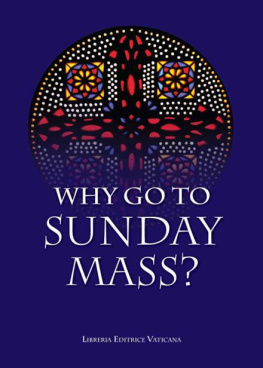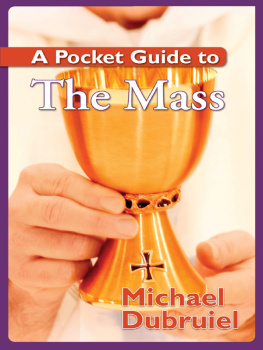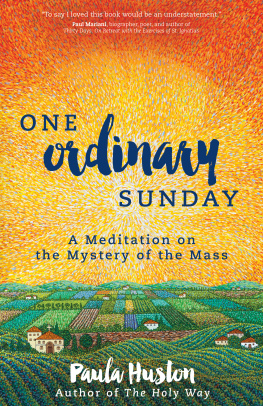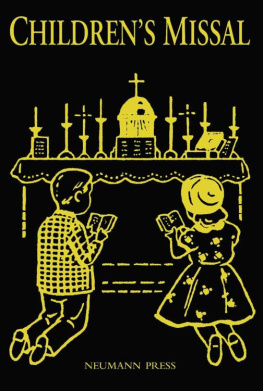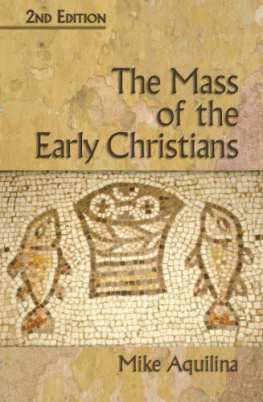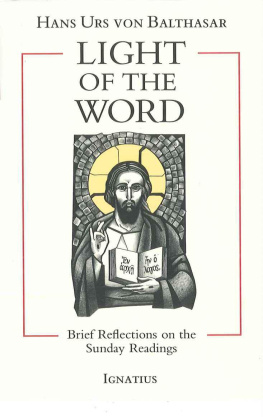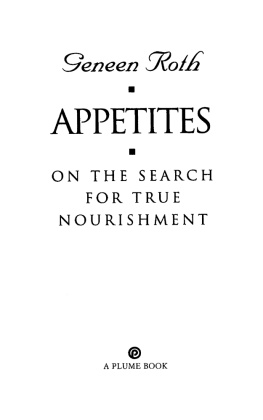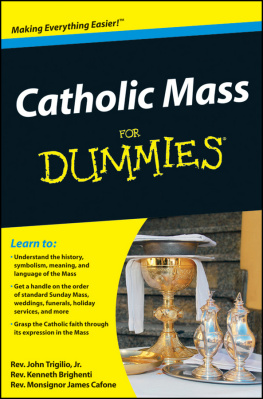Jorge Medina Estévez - Why Go to Sunday Mass?
Here you can read online Jorge Medina Estévez - Why Go to Sunday Mass? full text of the book (entire story) in english for free. Download pdf and epub, get meaning, cover and reviews about this ebook. year: 2012, publisher: United States Conference of Catholic Bishops, genre: Religion. Description of the work, (preface) as well as reviews are available. Best literature library LitArk.com created for fans of good reading and offers a wide selection of genres:
Romance novel
Science fiction
Adventure
Detective
Science
History
Home and family
Prose
Art
Politics
Computer
Non-fiction
Religion
Business
Children
Humor
Choose a favorite category and find really read worthwhile books. Enjoy immersion in the world of imagination, feel the emotions of the characters or learn something new for yourself, make an fascinating discovery.
- Book:Why Go to Sunday Mass?
- Author:
- Publisher:United States Conference of Catholic Bishops
- Genre:
- Year:2012
- Rating:5 / 5
- Favourites:Add to favourites
- Your mark:
- 100
- 1
- 2
- 3
- 4
- 5
Why Go to Sunday Mass?: summary, description and annotation
We offer to read an annotation, description, summary or preface (depends on what the author of the book "Why Go to Sunday Mass?" wrote himself). If you haven't found the necessary information about the book — write in the comments, we will try to find it.
Why Go to Sunday Mass? — read online for free the complete book (whole text) full work
Below is the text of the book, divided by pages. System saving the place of the last page read, allows you to conveniently read the book "Why Go to Sunday Mass?" online for free, without having to search again every time where you left off. Put a bookmark, and you can go to the page where you finished reading at any time.
Font size:
Interval:
Bookmark:
MASS?
Introduction by Cardinal Fortunato Baldelli
Libreria Editrice Vaticana
United States Conference of Catholic Bishops
Washington, DC
CONTENTS
What Specific Goals Do We Have
in Participating in the Celebration
of the Mass?
D ear Reader,
You are holding a book in your hand that may be small in size, but it is rich in content. In a few pages, and in simple language that is accessible to everyone, this book describes the essential facts about the Sacrament of the Eucharist and the dispositions we should have when we receive it.
On the last night of his life, Jesus gave us the most extraordinary gift we could possibly imagine. He gave himself to be present for us at all times under the species of consecrated bread and wine. We could say that Jesus devised the impossible so that he could always stay near us, but even more than staying near us, so that he could be inside us and be our nourishment along our path in this world.
This marvelous treasure of the Eucharist is always accessible to us. We can understand, then, why Christians from the very beginning of the Churchs history assemble on the first day of the week, the day of the Lords Resurrection, to repeat Jesus act of breaking the eucharistic Bread, which is what he asked the Apostles to do on Holy Thursday: Do this in remembrance of me (1 Cor 11:24). This Bread is truly indispensable food for Christians, our sustenance on our journey through life. Just as our bodies need daily nourishment, so too the health of our souls cannot do without this eucharistic Bread. This is the reason for our obligation to attend Mass on Sundays and on the major feasts that celebrate the mysteries of the Lords life.
Given the above, it is clear that for us to attend Mass and receive this Bread, there are certain requirements of spiritual hygiene, so to speak, a careful inner cleansing.
The following pages will remind you, first of all, of the immense grace of the presence of the Lord in the Sacrament of the Eucharist and of our obligation to encounter him at least every Sunday and on the major feast days of the Christian calendar. Next, you will be reminded of the things you should keep in mind so that your encounter with the Lord will be very fruitful and respectful of him.
Cardinal Fortunato Baldelli
Major Penitentiary
I applaud you if you are already going to Mass every Sunday and on the major feast days of the Christian calendar, because participation in the Mass is an essential element in the life of any Catholic. We will discuss why a bit later.
However, some Catholics do not always go to Mass, or rarely go, and that does not seem to concern them very much.
Why?
Some say they go when they feel a desire to go . Do you go to work only when you feel like it? Do you pay your taxes only when you feel like it? If you are the mother of a small child, do you feed him or her only when you want to? Many times we perform certain actions without experiencing any desire to do so, but they do not cease being authentic or worth doing because of that. It is pleasant for us to do the things we want to, but having a desire to do them is not the only reason to act and is not even the main reason. It would be quite serious, and even less than human, if we did things only because we felt like it or did not feel like it. When we do something by overcoming our lack of desire, it means there is a good reason for doing it: duty or, even better, love.
Others say they do not go because they do not have the time . In certain cases that can be true if someone has an urgent duty that cannot be postponed. However, that kind of situation occurs infrequently, because Mass schedules vary, and it is generally possible to find a time that is compatible with our other duties. Many times the statement I have no time is the euphemism we use to avoid speaking honestly and admitting, I am not interested. When something really interests us, we find the time for it . We postpone other things, we change our schedules, and we make adjustments. It would be a serious matter if the Mass did not interest us or if other things were of much more interest to us.
However, there can be valid reasons that excuse us from attending Mass. Whoever finds themselves in those circumstances should be sorry that it is impossible to go; they should be unhappy about it and try to perform some act of piety at home that could help demonstrate the required respect for Sunday, the Lords Day, which is dedicated to him in a special way. In these cases it is advisable to join the celebration of the Holy Sacrifice of the Eucharist on the radio or television. Legitimate excuses can include sickness or the need to care for a sick person who has no other help and cannot be left alone. In somewhat the same category, the feebleness or infirmities of old age can make it more difficult for the person who is suffering to move around. Another valid reason could be a long trip that cannot be postponed. There can also be an emergency that needs to be dealt with that cannot be put off. Another good reason could involve the distance from the location where the Eucharist is being celebrated and the lack of transportation, or transportation that would require an extreme effort given the age and health of a person or given the driving conditions.
Anyone who is legitimately prevented from attending Mass should feel a kind of emptiness: something is missing that leaves a feeling of dissatisfaction. That would be a good sign. If someone does not have that response, it could be a cause for concern.
F irst of all, let us analyze the words here. The word go is not the best word to use, because it is too physical and implies motion and a destination. Certainly there is a need to go, but going to Mass really means performing a personal and communal action. We go to participate ; we go to take part . We go not just to be present in a passive manner and not just to listen ; we go to join in an action that involves all of us, that touches us personally, that calls to us, that requires a response from each of the participants that is personal, of course, but it is a response from people who belong to a community, the Church, the Body of Christ. We are all members of this Body and are jointly responsible and united in the same calling and to the same destiny. We go, then, to participate , to hear , to respond , to sing , to express our membership , and above all, to identify ourselves spiritually with what is being celebrated .
I t is a celebration , a festive activity in which the Church, represented by the local community presided over by a bishop or a priest, fulfills Jesus command to make present the Sacrifice of the Cross and to celebrate a memorial of his Passion, Death, and glorious Resurrection.
Jesus died on the Cross to offer the Father in heaven the homage of his perfect obedience in reparation for all the disobedience and sin on the part of human beings that have offended God. Jesus offered himself on the Cross for us, fulfilling his own words when he said, No one has greater love than this, to lay down ones life for ones friends (Jn 15:13). Therefore, the Death of Jesus on the Cross is an act of love toward the Father, an act of obedience to his will, which is that our salvation would occur through the Death of his Son in his humanity (see Phil 2:6-11). It is also an act of infinite charity toward human beings, since he offers himself for us and gives us the opportunity to re-establish an authentic relationship with God and thus take seriously the words of St. Paul who affirmed that all Christians, without exception, live for the Lord and... die for the Lord (see Rom 14:8).
Font size:
Interval:
Bookmark:
Similar books «Why Go to Sunday Mass?»
Look at similar books to Why Go to Sunday Mass?. We have selected literature similar in name and meaning in the hope of providing readers with more options to find new, interesting, not yet read works.
Discussion, reviews of the book Why Go to Sunday Mass? and just readers' own opinions. Leave your comments, write what you think about the work, its meaning or the main characters. Specify what exactly you liked and what you didn't like, and why you think so.

